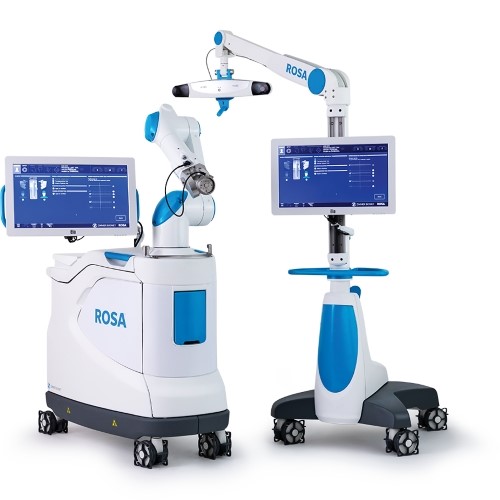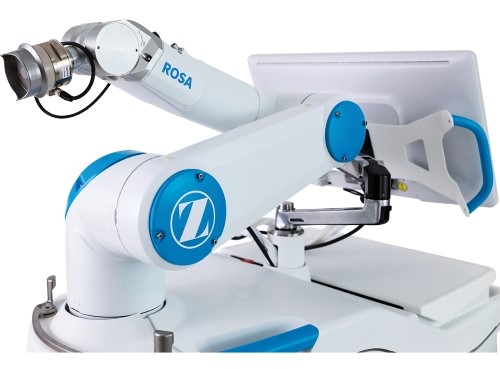Advanced Robotic-Assisted Surgical Technology for Joint Replacement
At the Chicago Center for Orthopedics and Robotic-Assisted Surgery, we utilize the ROSA® Knee System from Zimmer Biomet for a customized surgical approach to each patient’s knee replacement. ROSA, which stands for Robotic Surgical Assistant, is designed to help our specially trained orthopedic surgeons tailor the placement of each patient’s knee implant. The ROSA Knee System uses data collected before and during surgery to inform the surgeon of the many details related to each patient’s unique anatomy that may affect the fit of the implant. By using this data to make more informed decisions, the surgeon is able to plan for and carry out a personalized surgery based upon individual needs.
Using the ROSA® Knee System for total knee replacement can lead to the following patient benefits:
- Patients can potentially save money on their ROSA robotic surgery as the system does not require the use of CT scans1
- Less exposure to radiation2
- Increased accuracy compared to traditional knee replacement 3-4
- Better implant positioning, which can result in a more natural-feeling knee after surgery 5
- Potential for better long-term satisfaction and outcomes 6
1 Poslusny, Catherine. What Is the Cost of a CT Scan in the U.S.? 31 July 2018, www.newchoicehealth.com/ct-scan/cost.
2 Wehner, Eleanor, and Olivier Boisvert. “Why Use X-Ray over Computed Tomography: ROSA(R) Knee Pre-Operative Planning.” Zimmer Biomet, Montreal, Quebec, Canada, 2019.
3 Parratte, S., et al. Accuracy of New Robotically-assisted Technique for Total Knee Arthroplasty: A Cadaveric Study. The Journal of Arthroplasty. 34(11): 2799-2803, 2019.
4 Seidenstein A, Birmingham M, Foran J, Ogden S. Better accuracy and reproducibility of a new robotically-assisted system for total knee arthroplasty compared to conventional instrumentation: a cadaveric study. Knee Surg Sports Traumatol Arthrosc. 2020 May 24. doi: 1007/s00167-020- 06038-w. Epub ahead of print. PMID: 32448945. Cadaveric testing is not necessarily indicative of clinical performance.
5 Kayani B, Haddad FS. Robotic total knee arthroplasty: clinical outcomes and directions for future research. Bone Joint Res. 2019;8(10):438-442. Published 2019 Nov 2. doi:10.1302/2046- 3758.810.BJR-2019-0175.
6 Marchand RC, Sodhi N, Khlopas A, et al. Patient satisfaction outcomes after robotic arm-assisted total knee arthroplasty: a short-term evaluation. J Knee Surg 2017;30:849-853.


